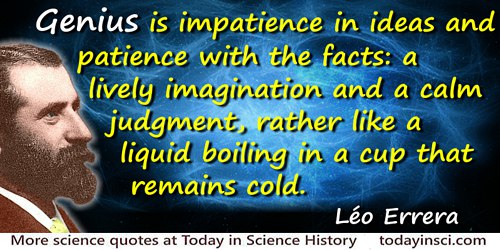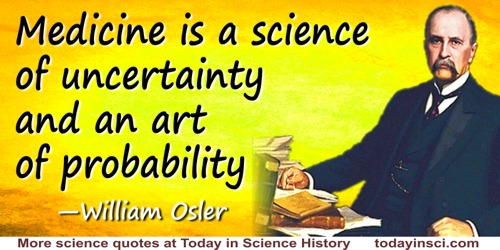Aphorism Quotes (22 quotes)
δος μοι που στω και κινω την γην — Dos moi pou sto kai kino taen gaen (in epigram form, as given by Pappus, classical Greek).
δος μοι πα στω και τα γαν κινάσω — Dos moi pa sto kai tan gan kinaso (Doric Greek).
Give me a place to stand on and I can move the Earth.
About four centuries before Pappas, but about three centuries after Archimedes lived, Plutarch had written of Archimedes' understanding of the lever:
Archimedes, a kinsman and friend of King Hiero, wrote to him that with a given force, it was possible to move any given weight; and emboldened, as it is said, by the strength of the proof, he asserted that, if there were another world and he could go to it, he would move this one.
A commonly-seen expanded variation of the aphorism is:
Give me a lever long enough and a place to stand, and I can move the earth.
δος μοι πα στω και τα γαν κινάσω — Dos moi pa sto kai tan gan kinaso (Doric Greek).
Give me a place to stand on and I can move the Earth.
About four centuries before Pappas, but about three centuries after Archimedes lived, Plutarch had written of Archimedes' understanding of the lever:
Archimedes, a kinsman and friend of King Hiero, wrote to him that with a given force, it was possible to move any given weight; and emboldened, as it is said, by the strength of the proof, he asserted that, if there were another world and he could go to it, he would move this one.
A commonly-seen expanded variation of the aphorism is:
Give me a lever long enough and a place to stand, and I can move the earth.
As attributed to Pappus (4th century A.D.) and Plutarch (c. 46-120 A.D.), in Sherman K. Stein, Archimedes: What Did He Do Besides Cry Eureka? (1999), 5, where it is also stated that Archimedes knew that ropes and pulley exploit “the principle of the lever, where distance is traded for force.” Eduard Jan Dijksterhuis, in his book, Archimedes (1956), Vol. 12., 15. writes that Hiero invited Archimedes to demonstrate his claim on a ship from the royal fleet, drawn up onto land and there loaded with a large crew and freight, and Archimedes easily succeeded. Thomas Little Heath in The Works of Archimedes (1897), xix-xx, states according to Athenaeus, the mechanical contrivance used was not pulleys as given by Plutarch, but a helix., Heath provides cites for Pappus Synagoge, Book VIII, 1060; Plutarch, Marcellus, 14; and Athenaeus v. 207 a-b. What all this boils down to, in the opinion of the Webmaster, is the last-stated aphorism would seem to be not the actual words of Archimedes (c. 287 – 212 B.C.), but restatements of the principle attributed to him, formed by other writers centuries after his lifetime.
“Le génie n'est qu'une longue patience”, a dit Buffon. Cela est bien incomplet. Le génie, c'est l'impatience dans les idées et la patience dans les faits : une imagination vive et un jugement calme; quelque chose comme un liquide en ébullition dans un vase qui reste toujours froid.
“Genius is just enduring patience,” said Buffon. This is far from complete. Genius is impatience in ideas and patience with the facts: a lively imagination and a calm judgment, rather like a liquid boiling in a cup that remains cold.
“Genius is just enduring patience,” said Buffon. This is far from complete. Genius is impatience in ideas and patience with the facts: a lively imagination and a calm judgment, rather like a liquid boiling in a cup that remains cold.
In Recueil d'Œuvres de Léo Errera: Botanique Générale (1908), 198. Google translation by Webmaster.
Ars longa, vita brevis.
Art is long, life is short.
Art is long, life is short.
Aphorisms, i. The original was written in Greek. This Latin translation, by Seneca (De Brevitate Vitae, 1.1), is in John Bartlett, Familiar Quotations (1905), 6, footnote 3. The sense is generally taken to be, 'Life is short, but to learn a profession (an art) takes a long time.'
Contraria sunt complementa.
Opposites are complementary.
Opposites are complementary.
Motif on Niels Bohr's coat of arms.
L’Art est fait pour troubler, la Science rassure.
Art is meant to disturb, science reassures.
Art is meant to disturb, science reassures.
From the original French, “L’Art est fait pour troubler, la Science rassure,” in Pensées sur l’Art. As translated by S. Appelbaum in Georges Braque Illustrated Notebooks: 1917-1955 (1971), 10. Also seen elsewhere translated as, “Art upsets, science reassures” or “Art is meant to upset people, science reassures them.”
La vérité est sur une courbe dont notre ésprit suit éternellement l'asymptote. (Oct 1879)
Truth is on a curve whose asymptote our spirit follows eternally.
Truth is on a curve whose asymptote our spirit follows eternally.
In Recueil d'Œuvres de Léo Errera: Botanique Générale (1908), 193. As translated in John Arthur Thomson, Introduction to Science (1911), 57,
Natura nihil agit frustra.
Nature does nothing in vain.
Nature does nothing in vain.
The idea that nature does nothing in vain can be found in many texts by Aristotle: De Caelo 271a 33, 291b 13-14; De Anima 432b 21, 434a 41; P.A. 661b 24, 691b 4-5, 694a 15, 695b 19-20; G.A. 739b 19, 741b 4, 744a 37-8. The original Greek over the centuries was repeatedly hand-copied and variously translated. The quote as shown above is none-the-less ascribed to “Anonymous” in James Wood, Dictionary of Quotations from Ancient and Modern, English and Foreign Sources (1893), 290:9. For comparison, in De Caelo translated by J.L.Stocks (1922), the last sentence of 291a is given as “But God and nature create nothing that has not its use,” and 291b as “Nature is no wanton or random creator.” In De Anima, 432b, J.A. Smith translates Aristotle’s words as “Nature never makes anything without a purpose,” whereas R.D. Hicks wrote a translation (1907), giving the same quote as “Nature does nothing in vain,” on p.149.
~~[Attributed]~~ Prudens quaestio dimidium scientiae.
Half of science is asking the right questions.
Half of science is asking the right questions.
Also translated as, “To ask the proper question is half of knowing.” Also seen translated as “Half of science is putting forth the right questions,” in Jon R. Stone, The Routledge Dictionary of Latin Quotations (2005), 92. This quote, or a variant, is widely found widely in quote collections and books, but seemingly always without explicit primary source citation. It may have been derived from “Prudens interrogatio quasi dimidium sapientiae.” (A prudent question is, as it were, one half of wisdom), as printed in The Works of Francis Bacon: Philosophical Works (1857), 635. Webmaster has not, as yet, identified a verbatim primary source for the subject quote in Latin. Meanwhile, note the the sense of “scientiae” in Bacon’s time meant “a corpus of human knowledge” rather than the more specific use of the word “science” today. (Sometimes the quote is found attributed to Roger Bacon, which Webmaster, for lack of evidence, currently believes is likely not correct.) [Please contact Webmaster if you can help.]
Beware of finding what you're looking for.
A favorite aphorism he often used.
A favorite aphorism he often used.
Though widely seen attributed as a caution Hamming often used, webmaster has found no evidence that he originated the saying. If you know a primary source, please contact webmaster.
Finally, to the theme of the respiratory chain, it is especially noteworthy that David Kellin's chemically simple view of the respiratory chain appears now to have been right all along–and he deserves great credit for having been so reluctant to become involved when the energy-rich chemical intermediates began to be so fashionable. This reminds me of the aphorism: 'The obscure we see eventually, the completely apparent takes longer'.
'David Kellin's Respiratory Chain Concept and Its Chemiosmotic Consequences', Nobel Lecture (8 Dec 1978). In Nobel Lectures: Chemistry 1971-1980 (1993), 325.
If I may paraphrase Hobbes's well-known aphorism, I would say that 'books are the money of Literature, but only the counters of Science.'
'Universities: Actual and Ideal' (1874). In Collected Essays (1893), Vol. 3, 213.
If we couldn’t laugh at ourselves, that would be the end of everything.
Comment made to Professor Erik Riidinger, 1962. Quotation supplied and translated by Professor Erik Rüdinger, Niels Bohr Archive.
If we peep into Dom Claude’s cell, we are introduced to a typical alchemist’s laboratory—a gloomy, dimly-lighted place, full of strange vessels, and furnaces, and melting-pots, spheres, and portions of skeletons hanging from the ceiling; the floor littered with stone bottles, pans, charcoal, aludels, and alembics, great parchment books covered with hieroglyphics; the bellows with its motto Spira, Spera; the hour-glass, the astrolabe, and over all cobwebs, and dust, and ashes. The walls covered with various aphorisms of the brotherhood; legends and memorials in many tongues; passages from the Smaragdine Table of Hermes Trismegistus; and looming out from all in great capitals, ’ANAΓKH.
In The Birth of Chemistry (1874), 100.
It is another aphorism that no one knows everything about anything. That need not dull the pleasure and fascination of the fact that a great deal is known about some things.
In Splendid Isolation (1980), 38.
It is impossible to put together a single prescription that will cure all ailing bodies.
As quoted in Fred Rosner, The Medical Legacy of Moses Maimonides (1998), 51.
Medicine is a science of uncertainty and an art of probability.
William Bennett Bean (ed.), Sir William Osler: Aphorisms from his Bedside Teachings and Writings, No. 265 (1950), 125.
No aphorism is more frequently repeated in connection with field trials, than that we must ask Nature few questions, or, ideally, one question, at a time. The writer is convinced that this view is wholly mistaken. Nature, he suggests, will best respond to a logical and carefully thought out questionnaire; indeed, if we ask her a single question, she will often refuse to answer until some other topic has been discussed.
'The Arrangement of Field Experiments', The Journal of the Ministry of Agriculture, 1926, 33, 511.
Since the days of Hippocrates, our father, the aphorism has been the literary vehicle of the doctor… Laymen have stolen the trick from time to time, but the aphorism remains the undisputed contribution of the doctor to literature.
[Coauthor with Ray Marr]
[Coauthor with Ray Marr]
In Howard Fabing and Ray Marr (eds.), Fischerisms. Cited in epigraph, Robert Taylor, White Coat Tales: Medicine's Heroes, Heritage, and Misadventures (2010), 119.
Tell me what you eat: I will tell you what you are.
The Philosopher in the Kitchen (1825), Aphorism iv.
The discovery of a new dish does more for the happiness of mankind than the discovery of a star.
The Philosopher in the Kitchen (1825), Aphorism ix.
The history of Western science confirms the aphorism that the great menace to progress is not ignorance but the illusion of knowledge.
In Cleopatra’s Nose: Essays on the Unexpected (1994), 7.
Wit is the best safety valve modern man has evolved; the more civilization, the more repression, the more the need there is for wit.
Attributed.



 In science it often happens that scientists say, 'You know that's a really good argument; my position is mistaken,' and then they would actually change their minds and you never hear that old view from them again. They really do it. It doesn't happen as often as it should, because scientists are human and change is sometimes painful. But it happens every day. I cannot recall the last time something like that happened in politics or religion.
(1987) --
In science it often happens that scientists say, 'You know that's a really good argument; my position is mistaken,' and then they would actually change their minds and you never hear that old view from them again. They really do it. It doesn't happen as often as it should, because scientists are human and change is sometimes painful. But it happens every day. I cannot recall the last time something like that happened in politics or religion.
(1987) -- 


